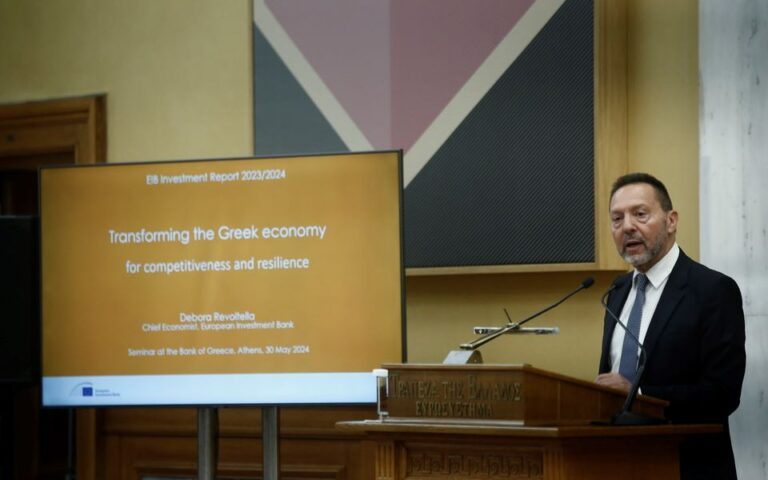
Bank of Greece Governor Yannis Stournaras spoke about the investment gap and the financing of investment needs at the presentation of the results of the EIB Investment Survey 2023 for Greece.
Mr. Stournaras reiterated his assessment that, in the coming years, the Greek economy is expected to record higher growth rates compared to the euro area. This development is particularly important, he said, as it reinforces the process of convergence of Greece's real GDP per capita towards the average levels of the European Union (EU), a process that was interrupted during the sovereign debt crisis.
The main drivers of economic activity will continue to be investment spending, thanks to the contribution of European funds, in particular the Recovery and Resilience Facility (RRF), and private consumption, due to the increase in real disposable income as a result of rising employment and falling inflation.
Given the problems associated with an ageing population, under-generation and low labour force participation, Stournaras said that the role of investment in physical and human capital is becoming crucial for the future course of the economy in both the short and long term. In the short term, investment spending boosts demand and the growth rate. In the long run, they increase the capital stock of the economy and accelerate the growth rate of potential output.
Investment expenditure can contribute to economic growth, whether it involves improvements in infrastructure, education, and health, or investment in productive equipment and machinery, as well as in intangible assets and cutting-edge technologies. As a result of an increase in the stock of physical and human capital, labour productivity is improved and a sustainable increase in real wages and living standards of workers is made possible.
However, the persistently low level of productive capital accumulation is a major obstacle to productivity growth and convergence with the EU average. In particular, since the sovereign debt crisis, investment in Greece as a share of GDP has diverged significantly from the EU average. According to the European Commission, investment in real terms in 2022 was around 50% lower than in 2008. The investment-to-GDP ratio, which hovered around 24% before 2008 (i.e. at a level comparable to the EU average), collapsed during the crisis and averaged 11.9% in 2010–2020. It is noted that a recent IMF study estimates that the investment gap in Greece, according to some measurements, reached up to 8% of GDP in 2019. According to the study, the factors that have had an inhibiting effect on investment include, in the case of business investment, structural barriers, and, in the case of household investment, developments in the business cycle and incomes.
Investment as a share of GDP has increased in recent years as a result of strong investment growth in 2021–2022. Business investment has fully recovered and has returned to pre-2010 levels, while residential investment is low but is nevertheless growing rapidly due to strong demand from domestic investors as well as from EU and non-EU investors under the Golden Visa programme. However, investment as a percentage of GDP remains below the EU average (14.3%, compared to 22.0% in the EU in 2023).
It should be noted, however, that the investment gap is not unique to the Greek economy. The EU as a whole also has an investment gap compared to the US. According to a recent EIB study, the EU's investment gap compared to the US is attributed, inter alia, to product dynamics, high cost of capital, financial constraints, the debt burden on businesses and uncertainty. In particular, there is a large gap in investment in information and communication equipment (especially in the services sector) and intellectual property products. In the case of Greece, the gap in productive investment compared to the US is the largest in the EU.






